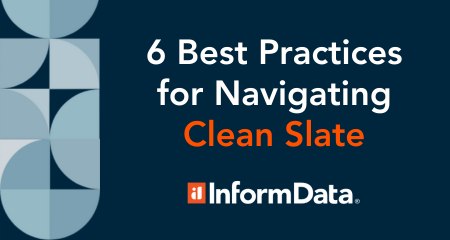Clean Slate laws are gaining significant traction nationwide. New York just got added to the growing list, and with several states currently entertaining pending bills, it's important to ensure your Consumer Reporting Agency (CRA) is well-prepared to navigate this evolving landscape.
For those who may not be familiar, the Clean Slate Movement represents a dedicated effort aimed at affording individuals with certain criminal records a fresh start. This is accomplished through the automatic expungement or sealing of prior convictions after a specified timeframe and under specific conditions.
The scope of the movement varies from state to state, introducing complexities such as restrictions on the types of criminal convictions and non-convictions eligible for sealing, as well as variations in the timeframes for expungement or sealing. The intricate details of these laws, coupled with diverse implementation methods, pose challenges for background screening companies and CRAs to navigate with efficiency and confidence. Michigan is a perfect example of just how difficult it can be to deal with the Clean Slate implementation process – more on that here.
We recently hosted a webinar with Pam Devata, Labor and Employment Partner at Seyfarth Shaw, and Vince Pascarella, InformData’s Chief Legal Officer, where they shared their valuable insights on how CRAs like yours can navigate this evolving movement. During the webinar, Pam shared her six best practices for consumer reporting agencies to embrace:
1. Stay Informed About Clean Slate Laws
The first and foremost practice is to keep yourself well-informed about Clean Slate laws. As mentioned above, these laws can vary widely from state to state, and understanding their implications is essential. So far, we’ve seen Clean Slate legislation enacted at the state level, but there may be a federal-level law implemented in the future. Staying updated on the ever-changing legal landscape will ensure that your background screening processes remain compliant and effective.
Our Clean Slate Hub is a great baseline to help you stay up to date on state involvement and various InformData resources as these laws continue to gain traction.
2. Implement an Internal Flagging/Notification System
To go the extra mile in Clean Slate compliance, consider implementing an internal flagging or notification system. This system can help your team identify records that may be subject to Clean Slate regulations. When encountering records from states where Clean Slate laws exist, your system can automatically trigger a notification for further investigation. This proactive approach ensures that you thoroughly assess the relevance of such records before reporting them to your clients.
“Pay attention to your disputes. Your disputes are just a treasure trove of information,” Pam explained in the webinar. “If someone says that something you reported about them is subject to Clean Slate, perform your root cause analysis to determine where you got the information from and if you should have even gotten it or reported it to your customer.”
3. Limit the Time Frame for Reporting
Another best practice is to consider limiting the timeframe for reporting. While many background screening companies default to the standard seven-year reporting period due to reporting restrictions, Clean Slate laws can significantly impact the availability of historical records. “For example, in states like Michigan, it’s much easier to get information within 7 years because the older records have been cleaned up already,” Pam explained. Adjust your reporting timelines to align with the Clean Slate laws in each jurisdiction to avoid unnecessary reporting of expunged records.
4. Scrutinize Vendor Data Refresh Rates
Your choice of vendors is critical in maintaining accurate and compliant background screening practices. “Ask your vendors about how often they refresh their static [database] data,” Pam suggests. It's essential to understand the frequency of data updates to ensure that you are working with the most current information. Be cautious about relying on static database data, as this may not accurately reflect the current status of an individual's record.
5. Verify Records at the Source
When it comes to Clean Slate records, it's crucial to verify information at the source. “Database searches, like a National Criminal Database Search (NatCrim), should be used as pointers only as they may be behind on getting modified to account for Clean Slate,” Pam explained in the webinar. Therefore, it's essential to cross-reference any information obtained from databases with primary sources, such as court records. This thorough verification process will help you provide accurate and up-to-date information to your clients.
6. Set Realistic Expectations with Customers
Finally, setting realistic expectations with your customers is vital. Pam suggests, “When clients approach you with Clean Slate-related inquiries, provide them with options and information.” For example, you can explain potential delays in obtaining certain records due to Clean Slate laws. Additionally, discuss whether they even want information older than seven years or if they wish to exclude records subject to Clean Slate regulations. Open and transparent communication with your customers will foster trust and ensure that their needs are met.
Adhering to these six best practices will not only keep your business compliant with these evolving laws but also enhance the quality and accuracy of the services you provide.
Get Informed
As your trusted industry partner, we are here to offer guidance and support. Check out our webinar to hear the expert advice from Pam Devata and Vince Pascarella on navigating this movement and visit our Clean Slate hub to view all our related resources. Stay informed and be proactive so your CRA can thrive in the era of Clean Slate.
We hope that the insights shared in the webinar and this article have empowered your CRA with essential information to better navigate Clean Slate going forward. As always, reach out to our team if we can assist you in any way.


